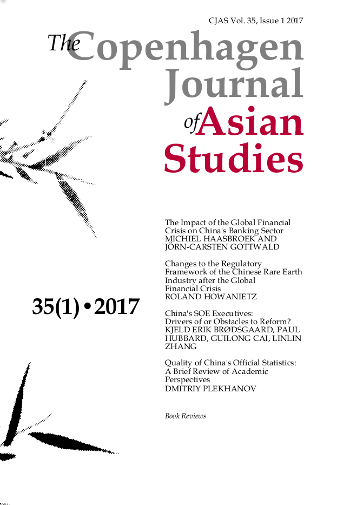China's SOE Executives: Drivers of or Obstacles to Reform?
DOI:
https://doi.org/10.22439/cjas.v35i1.5399Keywords:
China, state-owned enterprises, Chinese business executives, career incentives, economic performance, iron triangleAbstract
Drawing on a database tracking the career of 1,250 top Chinese executives from 1,084 publicly-listed state-owned enterprises (SOEs), this article analyzes differences in career incentives for subsidiaries controlled by the central government compared to those controlled by local governments. It also considers the differences for executives in listed companies close to the parent group compared to those that are heads in distant subsidiaries. We find that in both SOEs and their publicly listed subsidiaries, administrative experience or political connections appear to increase the likelihood of promotion. However, in the case of central SOE subsidiaries, leaders are more likely to be promoted based on financial performance. For both central and local 'direct' SOE groups age is a significant negative factor for promotion, whereas tenure is a significant positive factor.References
Brandt, Loren, Johannes Van Biesebroeck, and Yifan Zhang 2014. 'Challenges of Work¬ing with the Chinese NBS Firm-Level Data.' China Economic Review 30: 339–52. https://doi.org/10.1016/j.chieco.2014.04.008
Brødsgaard, Kjeld Erik 2011. 'A Note on China's 12th Five-Year Plan: Content and Implications.' The Copenhagen Journal of Asian Studies 29 (2): 143–53. https://doi.org/10.22439/cjas.v29i2.4030
Brødsgaard, Kjeld Erik 2012. 'Politics and Business Group Formation in China: The Party in Control?' The China Quarterly 211: 624–48. https://doi.org/10.1017/S0305741012000811
Chen, Chih Jou Jay 2006. 'Elite Mobility in Post-Reform Rural China.' Issues and Studies 42 (2): 53–83.
Choi, Eun Kyong 2012. 'Patronage and Performance: Factors in the Political Mobility of Provincial Leaders in Post-Deng China.' The China Quarterly 212: 965–81. https://doi.org/10.1017/S030574101200118X
Fan, Joseph P H, T. J. Wong, and Tianyu Zhang 2013. 'Institutions and Organizational Structure: The Case of State-Owned Corporate Pyramids.' Journal of Law, Economics, and Organization 29 (6): 1217–52.
Fu, Jenny 2013. 'The Governance of SOEs in China.' In Geoffrey Nicoll, Gerrard Brennan, and Jane Golley (eds.) The Australia-China Investment Relationship: Law, Governance and Policy. Canberra: Australian Centre on China in the World: 147-168.
Hubbard, Paul 2016a. 'Where Have China's State Monopolies Gone?' China Economic Journal 9 (1): 75–99. https://doi.org/10.1080/17538963.2016.1138695
Hubbard, Paul 2016b. 'Reconciling China's Official Statistics on State Ownership and Control.' EABER Working Paper Series. http://www.eaber.org/node/25575.
Hubbard, Paul, and Patrick Williams 2016. 'Chinese State Owned Enterprises: An Observer's Guide.' International Journal of Public Policy forthcoming).
Kornai, Janos 1992. The Socialist System: The Political Economy of Communism / Janos Kornai. Princeton, N.J: Princeton University Press. https://doi.org/10.1093/0198287763.001.0001
Kornai, János, Eric Maskin, and Gérald Roland 2013. 'Understanding the Soft Budget Constraint.' Journal of Economic Literature 41 (4): 1095-1136. https://doi.org/10.1257/jel.41.4.1095
Landry, Pierre F. 2008. Decentralized Authoritarianism in China: The Communist Party's Control of Local Elites in the Post-Mao Era. Cambridge; New York: Cambridge Uni¬versity Press.
Lardy, Nicholas R. 2014. Markets over Mao: The Rise of Private Business in China. Wash¬ington, DC: Petersen Institute for International Economics.
Li, Hongbin, and Li An Zhou. 2005. 'Political Turnover and Economic Performance: The Incentive Role of Personnel Control in China.' Journal of Public Economics 89 (9-10): 1743–62. https://doi.org/10.1016/j.jpubeco.2004.06.009
Lin, Yifu (Justin), and Guofu Tan 1999. 'Policy Burdens , Accountability , and the Soft Budget Constraint.' American Economic Review, 89 (2): 426–31.
Naughton, Barry 1996. Growing out of the Plan: Chinese Economic Reform, 1978-1993. Cambridge: Cambridge University Press.
Shih, Victor, Christopher Adolph, and Mingxing Liu 2012. 'Getting Ahead in the Communist Party: Explaining the Advancement of Central Committee Members in China.' American Political Science Review 106 (01): 166–87. https://doi.org/10.1017/S0003055411000566
Wu, Jinglian 2005. 'Reform of State-Owned Enterprises.' In Understanding and Interpreting Chinese Economic Reform. Mason, Ohio: Thomson South-Western: 139-176.
Yang, Ruilong Yang, Yuan Wang, and Huihua Nie. 2013. 'Zhun guanyuan de jinshengjizhi: lai zi Zhongguo qiye de zhengju' (The Promotion System for Quasi-Govern¬ment Officers: Evidence from Central State-Owned Enterprises in China). Manage¬ment World 3: 23–33.
Yao, Yang 2016. 'An Anatomy of the Chinese Selectocracy.' Unpublished paper pre¬sented at the international conference 'China: Wealth and Power', Australian National University, Canberra, 7-8 April 2016.
Zhang, Jin 2004. Catch-up and Competitiveness in China: The Case of Large Firms in the Oil Industry. London: New York, N.Y.: RoutledgeCurzon. https://doi.org/10.4324/9780203412862
Zhang, Linlin, Feng Liu, and Guilong Cai 2015. 'Jianguan duli xin, shichang hua jincheng yu guoqi gaoguan jinsheng jizhi de zhixing xiaoguo - jiyu 2003-2012 nian guoqi gaoguan zhiwei biangeng de shuju' (Regulatory Independence, Market-oriented Process and the Implementation Result of Executive Promotion System in the SOEs - Based on the SOE Executives Turnover data 2003-2012). Guanli shijie 10: 25–39.


